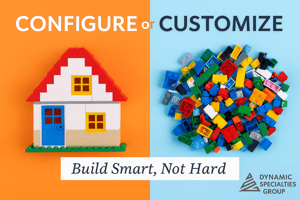Let’s be honest—when someone says “discovery,” “governance,” or “project communication,” most...
Battle of the Clouds: B2B vs. B2C in Salesforce Commerce
Salesforce is best known for being the top CRM in the world—but did you know they also have some serious e-commerce tools? Whether you’re selling to everyday shoppers or big business clients, Salesforce has two powerful platforms to help: B2C Commerce Cloud and B2B Commerce Cloud.
Not sure which one’s right for your business? No worries. Let’s break it down together.
So, What is the Salesforce Commerce Cloud Anyway?

Think of Salesforce Commerce Cloud (SFCC) as your all-in-one solution for running online stores and connecting with customers across every digital channel, whether it’s your website, mobile app, social media, or even in-store.
Salesforce didn’t build it from scratch; rather, they made two smart acquisitions:
- Demandware (now B2C Commerce) in 2016 for retail-style selling
- CloudCraze (now B2B Commerce) in 2018 for business-to-business sales
Both tools live under the Commerce Cloud umbrella but serve very different types of businesses. That’s where things get interesting.
B2C Commerce Cloud: Great for Retail & DTC Brands
If you’re selling directly to customers—think fashion, electronics, beauty, or any direct-to-consumer (DTC) product—B2C Commerce Cloud is probably what you’re looking for.
It’s got all the bells and whistles you need to deliver a slick, personalized shopping experience:
- Fully customizable storefronts (especially with PWA Kit and headless options)
- Smart product recommendations using Salesforce Einstein
- Tools to manage multi-store, multi-language, and multi-currency operations
- Advanced promotions, sales campaigns, and dynamic pricing tools
One heads-up, though: While B2C Commerce is super powerful, it’s also technically complex. Custom development is often required, which is where a Salesforce partner (like DSG) can really help bring your vision to life.
B2B Commerce Cloud: Built for Business Buying
On the flip side, if you’re selling to other businesses—maybe you’re a wholesaler, distributor, or manufacturer—B2B Commerce Cloud is likely the better fit.
B2B selling looks a lot different than retail and involves more complex processes. It’s more about:
- Bulk orders and extensive catalogs
- Custom pricing based on contracts
- Reorders, recurring purchases, and negotiated terms
- Approval workflows and multi-tiered buying roles
B2B Commerce supports all this with robust features like:
- Self-service portals for fast and easy ordering
- Quick reorder capabilities
- Native Salesforce CRM and Service Cloud integration for complete customer visibility
- Support for headless commerce via Salesforce Commerce APIs
These built-in features, alongside seamless CRM integration, your sales team will always have the whole picture.
Quick Comparison: B2B vs. B2C
Here’s a simple side-by-side to help you figure out what’s what:
|
Focus |
B2C Commerce |
B2B Commerce |
|
Who you sell to |
Individual shoppers |
Business buyers/accounts |
|
Order types |
One-off purchases, fast checkout |
Bulk orders, contract pricing |
|
Pricing |
Discounts, promos, dynamic pricing |
Negotiated, account-based pricing |
|
Buying journey |
Quick and visual |
Multi-step, more structured |
|
Customization |
Super flexible, dev-intensive |
Templated, faster to launch |
The Bonus: AI + Personalization for Both
No matter which platform you choose, both B2B and B2C Commerce Cloud come with built-in Salesforce Einstein capabilities to boost sales and help customers find what they need faster.
That means:
- Recommend products based on past behavior
- Personalize content and offers
- Track trends and forecast demand
It’s all built right into the platform, so you’re not left guessing what your customers want. Instead, you can better predict what your customers want and deliver it at the right time.
A Few Extras to Consider
- Both platforms now support headless commerce, allowing you to build custom front-end experiences using Salesforce Commerce APIs.
- For hybrid business models (B2B2C), you can implement both solutions and unify them through Salesforce CRM.
- Need to manage fulfillment, shipping, or returns? Add Salesforce Order Management to streamline post-purchase operations.
Let’s Make It Work for You
Choosing between B2B and B2C Commerce is just the first step. The real magic happens when you tailor it to your business. At Dynamic Specialties Group, we help companies do just that—from custom development to full Salesforce integration.
Not sure where to start? Let’s chat and figure it out together.



